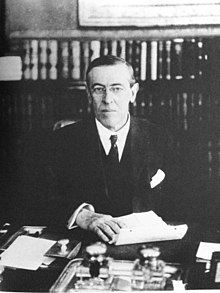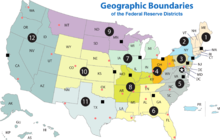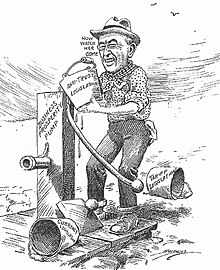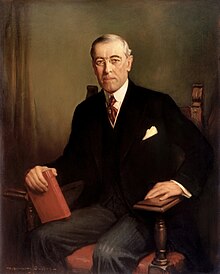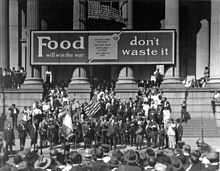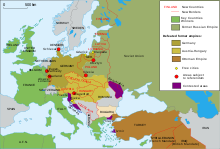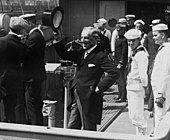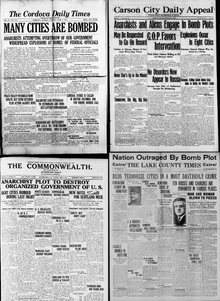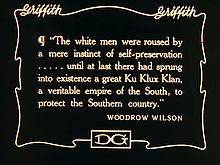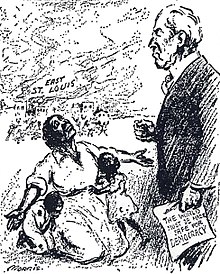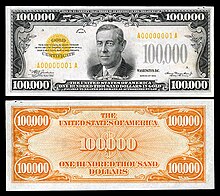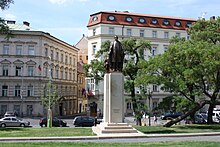Woodrow Wilson
[2] Wilson's maternal grandfather, the Reverend Thomas Woodrow, moved from Paisley, Renfrewshire, Scotland, to Carlisle, Cumbria, England, before migrating to Chillicothe, Ohio, in the late 1830s.
[5] Wilson's earliest memory of his early youth was of playing in his yard and standing near the front gate of the Augusta parsonage at the age of three, when he heard a passerby announce in disgust that Abraham Lincoln had been elected and that a war was coming.
[38][39] In February 1890, with the help of friends, Wilson was appointed Chair of Jurisprudence and Political Economy at the College of New Jersey (the name at the time of Princeton University), at an annual salary of $3,000 (equivalent to $101,733 in 2023).
"[46] He also wrote that charity efforts should be removed from the private domain and "made the imperative legal duty of the whole", a position which, according to historian Robert M. Saunders, seemed to indicate that Wilson "was laying the groundwork for the modern welfare state.
[53][page needed] To fund these new programs, Wilson undertook an ambitious and successful fundraising campaign, convincing alumni such as Moses Taylor Pyne and philanthropists such as Andrew Carnegie to donate to the school.
"[70] By January 1910, Wilson had drawn the attention of James Smith Jr. and George Brinton McClellan Harvey, two leaders of New Jersey's Democratic Party, as a potential candidate in the upcoming gubernatorial election.
[79] Wilson and his allies quickly won passage of the Geran bill, which undercut the power of the political bosses by requiring primaries for all elective offices and party officials.
[85] A new State Board of Education was set up "with the power to conduct inspections and enforce standards, regulate districts' borrowing authority, and require special classes for students with handicaps.
[89] Wilson became a prominent 1912 presidential contender immediately upon his election as Governor of New Jersey in 1910, and his clashes with state party bosses enhanced his reputation with the rising Progressive movement.
[102] Wilson directed campaign finance chairman Henry Morgenthau not to accept contributions from corporations and to prioritize smaller donations from the widest possible quarters of the public.
[103] During the election campaign, Wilson asserted that it was the task of government "to make those adjustments of life which will put every man in a position to claim his normal rights as a living, human being.
[120] He announced four major domestic priorities: the conservation of natural resources, banking reform, tariff reduction, and better access to raw materials for farmers by breaking up Western mining trusts.
[124] He argued that the system of high tariffs "cuts us off from our proper part in the commerce of the world, violates the just principles of taxation, and makes the government a facile instrument in the hands of private interests.
[138] With Wilson's support, Congressman Henry Clayton, Jr. introduced a bill that would ban several anti-competitive practices such as discriminatory pricing, tying, exclusive dealing, and interlocking directorates.
[188] In an effort to win progressive voters, Wilson called for legislation providing for an eight-hour day and six-day workweek, health and safety measures, the prohibition of child labor, and safeguards for female workers.
[190] Hoping to reunify the progressive and conservative wings of the party, the 1916 Republican National Convention nominated Supreme Court justice Charles Evans Hughes for president; as a jurist, he had been completely out of politics by 1912.
[213] Meanwhile, French and British leaders convinced Wilson to send a few thousand American soldiers to join the Allied intervention in Russia, which was in the midst of a civil war between the Communist Bolsheviks and the White movement.
[222] In addition to spending on its own military build-up, Wall Street in 1914–1916 and the Treasury in 1917–1918 provided large loans to the Allied countries, thus financing the war effort of Britain and France.
It consisted of Wilson, Colonel House,[b] Secretary of State Robert Lansing, General Tasker H. Bliss, and diplomat Henry White, who was the only Republican, and he was not an active partisan.
[236] The covenant bound members to respect freedom of religion, treat racial minorities fairly, and peacefully settle disputes through organizations like the Permanent Court of International Justice.
Wilson's hopes for achieving self-determination saw some success when the conference recognized multiple new and independent states created in Eastern Europe, including Albania, Czechoslovakia, Poland, and Yugoslavia.
[247] The remaining group of senators, known as "reservationists", accepted the idea of the League but sought varying degrees of change to ensure the protection of American sovereignty and the right of Congress to decide on going to war.
[249] When Lodge was on the verge of building a two-thirds majority to ratify the Treaty with ten reservations, Wilson forced his supporters to vote Nay on March 19, 1920, thereby closing the issue.
Many expressed qualms about Wilson's fitness for the presidency at a time when the League fight was reaching a climax, and domestic issues such as strikes, unemployment, inflation and the threat of Communism were ablaze.
He did not speak publicly on the issue except to echo the Democratic Party position that suffrage was a state matter, primarily because of strong opposition in the white South to black voting rights.
[287] After the end of his second term in 1921, Wilson and his wife moved from the White House to a townhouse in the Kalorama section of Washington, D.C.[288] He continued to follow politics as President Harding and the Republican Congress repudiated membership in the League of Nations, cut taxes, and raised tariffs.
[305] Though he was not initially critical of the movie, Wilson distanced himself from it as public backlash mounted and eventually released a statement condemning the film's message while denying he had been aware of it prior to the screening.
In 1919, Black veterans returning home to D.C. were shocked to discover Jim Crow laws had set in; many could not go back to the jobs they held prior to the war or even enter the same building they used to work in due to the color of their skin.
Following Wilson's appointment of Josephus Daniels as Secretary of the Navy, a system of Jim Crow was swiftly implemented; with ships, training facilities, restrooms, and cafeterias all becoming segregated.
'"[340] Notwithstanding his accomplishments in office, Wilson has received criticism for his record on race relations and civil liberties, for his interventions in Latin America, and for his failure to win ratification of the Treaty of Versailles.




